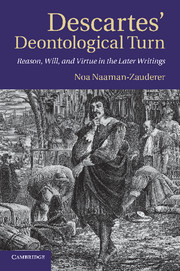Book contents
Introduction
Published online by Cambridge University Press: 10 January 2011
Summary
One of the most challenging tasks that Descartes' philosophical corpus poses to interpreters is that of explaining the kind of responsibility we bear for our judgments and actions. This book offers a new way of approaching the issue of responsibility by bringing to light a deontological and non-consequentialist dimension of Descartes' later thinking, which credits the proper use of free will with a constitutive, evaluative role. The book explores prominent manifestations of Descartes' deontological approach, an aspect of his thinking that current interpretations have largely overlooked. Relying on a close reading of the Meditations and subsequent writings, I propose a new interpretation of several of Descartes' key epistemological doctrines and of the sense in which he considers human reason to be autonomous. Without denying the centrality of the intellect in the search for truth, or Descartes' deep interest in establishing the foundations of his science, I argue that he sees the right use of free will not merely as a means to some other, superior end but as an end in its own right. I claim, moreover, that Descartes views the will rather than the intellect as the most significant mark of human rationality, both intellectual and practical. I will then rely on this reading to interpret his statement that the human will constitutes the most prominent manifestation of our similitude to God.
- Type
- Chapter
- Information
- Descartes' Deontological TurnReason, Will, and Virtue in the Later Writings, pp. 1 - 9Publisher: Cambridge University PressPrint publication year: 2010

